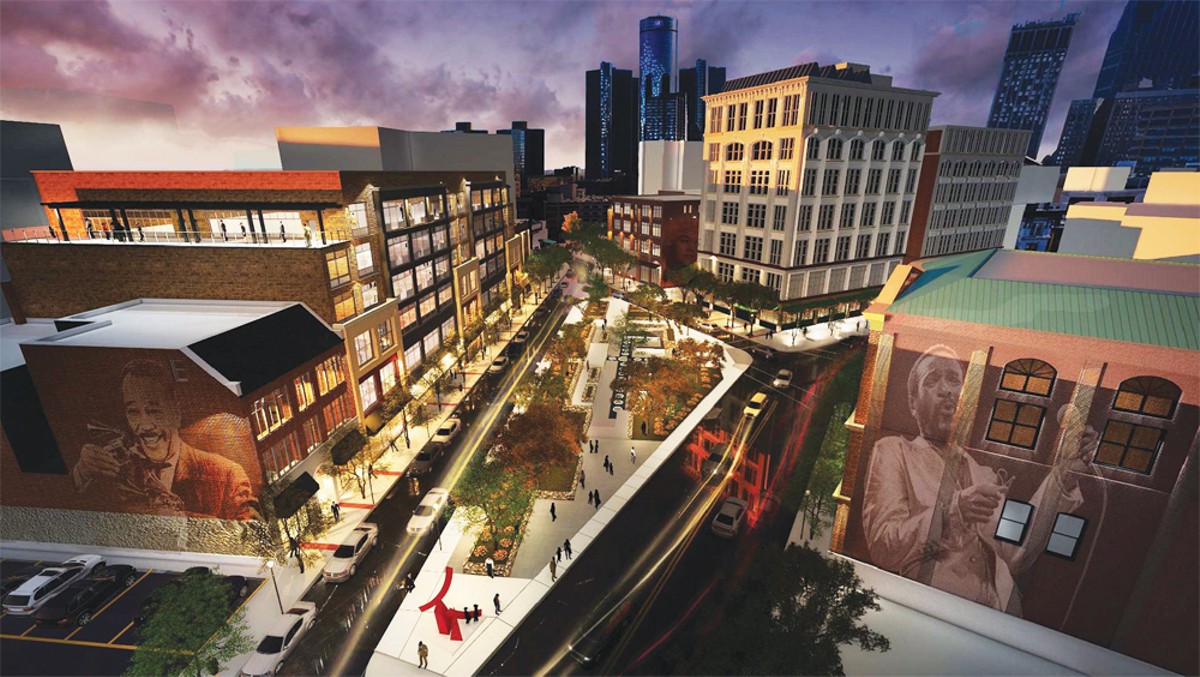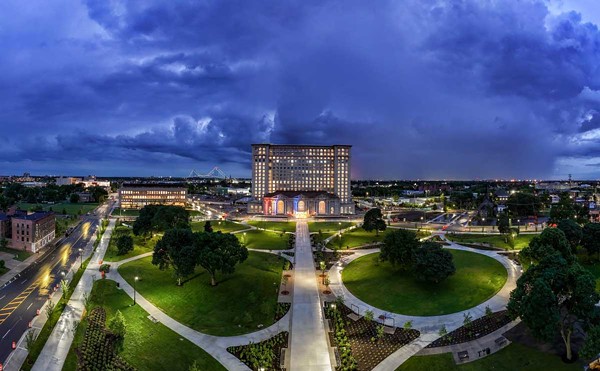It's a busy Friday night in Harmonie Park. A warm summer breeze greets the lively crowds at spots like the Detroit Seafood Market and Centre Park Bar, both swanky destinations for fine dining and libations. Around the corner on Broadway, souped-up motorcycles line the curb, while droves of millennials congregate outside of Punch Bowl Social.
This pocket of downtown is already a hot spot for black nightlife in Detroit, a section that enjoys jazz concerts in the park during the summer and where African-American business owners have worked for the past several years to create a dynamic entertainment district.
It also just happens to be the beginnings of a new area that aims to restore the city's historic Paradise Valley entertainment district. Developers are banking on this type of energy in a section of Detroit that was once the center of black enterprise in the city, before it was destroyed decades ago to make way for a freeway.
Ask folks like Dennis Archer Jr., co-owner of Central Kitchen + Bar on nearby Cadillac Square, president of Ignition Media Group, and a founding principal at Hamilton Woodlynne Publishing, which publishes Ambassador, a magazine that highlights entrepreneurship in southeast Michigan.
"I loved that it was centered around the park, but also loved the way that it's kind of nestled off on its own downtown," Archer says.
Or talk to Hiram Jackson, publisher of The Michigan Chronicle, one of the oldest black-centric newspapers in the country, which opened 80 years ago in the original Paradise Valley district at 1727 St. Antoine.
"I think that the creation of Paradise Valley will go a long way in creating a more diverse environment," Jackson says.
What Archer and Jackson are referring to is the creation of the Paradise Valley Cultural and Entertainment District, a decade-long effort by the city to re-create the essence of the historic neighborhood. The two are among a handful of mostly black investors who recently won bids to redevelop nine parcels in a section on or around Randolph roughly between Gratiot and Madison — a project that will pump some $52.4 million in investment into the area.
Among the plans are retail and restaurants, residential and office space, and a boutique hotel, as well as investments from longtime business owners like Rainy Hamilton of architecture firm Hamilton Anderson Associates, who's been a renting tenant in the district for the past 22 years, and the owners behind the longtime La Casa Cigars and Lounge. Both plan to revamp their properties for a combined investment of nearly $9 million.
The project represents the many strides African-American entrepreneurs are making to put a dent in downtown development in a city that is more than 80 percent black.
As a whole, some 60 percent of businesses in the Motor City are black-owned, but the central business district is dominated by Dan Gilbert's Rock Ventures, the parent company of nearly 70 businesses in Detroit and Cleveland.
While developers involved in the Paradise Valley Cultural and Entertainment District caution that the project represents but a small fraction of development as a whole, they agree it's a start.
"Seven properties in a one-block radius is not doing the job" toward creating equity, says Archer, but he adds that preserving the legacy of the contributions of the historic African-American district is a step in the right direction.
Archer, working with Gotham Capital Partners, will renovate 1407 and 1427 Randolph, two buildings that take up 17,328 square feet, with a high-end cocktail lounge on the first floor and office space on the upper floors. The group's investment is estimated at $2.7 million, including the purchase price of $976,000.
Jackson, with Paradise Valley Real Estate Holdings II LLC, will build anew on three lots at 1468, 1480, and 1496 Randolph to make way for 60 apartment units, a parking deck, and retail space. The development is adjacent to a property where Paradise Valley Real Estate Holdings I expects to renovate to relocate the headquarters of Real Times Media, the parent company of The Michigan Chronicle.
"Paradise Valley is where The Michigan Chronicle was founded in 1936. Building Hastings Place next door continues the legacy and spirit of Paradise Valley that was started by African-American business pioneers and entertainers more than 80 years ago," Jackson said in an announcement.
The rise and fall of Detroit's Black Bottom
Also known as Detroit's "Black Bottom," Paradise Valley historically took up some 66 square blocks. Some say the area was bounded by Vernor, John R, Madison, and Hastings, while others say the neighborhood was bordered by Adams, Brush, Alexandrine, and Hastings. The community swelled from about 40,000 to 120,000, mostly by Southern blacks who flocked to Detroit for work in the automotive industry. The neighborhood was the only area where African-Americans could live at the time in the deeply segregated city.
It's there where all manner of black-owned businesses thrived, as well as a vibrant nightclub and music scene, with the likes of jazz greats Louis Armstrong, Ella Fitzgerald, Billie Holiday, Duke Ellington, and others performed at the iconic Paradise Theatre, which opened its doors in 1941.
In the 1940s, the early signs of Paradise Valley's demise began to show, amid substandard living conditions and racial tensions brought on by the 1943 riots. Drawings of a freeway system that would serve the already-sprawling metropolis were being rendered. Around that time, a seven-man panel appointed by then-Mayor Edward J. Jeffries came up with a master plan for the city's transportation infrastructure, which included, among other things, architectural sketches for the so-called Hastings Expressway, which would pave over the commercial district that encompassed Black Bottom.
By 1962, Paradise Valley and Black Bottom were gone, save for a few structures, to make way for the newly constructed Chrysler Freeway — with Hastings Street serving as the main artery for the new highway.
False starts
The effort today to redevelop an iteration of Paradise Valley can be traced back decades. In the late '90s, as the then-unnamed Lions stadium was under construction, a campaign was led by historical preservationists to have the last remaining parcels from the Black Bottom era saved from demolition. The district, made up of three properties on St. Antoine at Madison, was granted interim historic designation for several years, as plans for its use were debated by City Council.
Among the proposals brought to council in 1997 was a large-scale entertainment development that would have included a hotel, jazz clubs, dinner clubs, a 2,500-seat Paradise Theatre, a replica of the Graystone Ballroom, a youth complex, and other amenities. The land was owned then by the Detroit Lions; the organization had vowed to set aside space to commemorate the historic area. Ultimately, those plans dissolved, the buildings were torn down, and all that remains is a sign from the state of Michigan that serves as a place marker reminding football fans of the district's long-defunct past.
In a 2002 Detroit Free Press article, reporter Bill McGraw wrote: "It has taken more than 40 years, but the city finally has eradicated virtually all traces of a neighborhood that continues to resonate for many black Detroiters. It was turf that served as the incubator for bluesman John Lee Hooker, the family of Motown founder Berry Gordy Jr., and former Mayor Coleman Young. It was a place that — if left standing — would rival most nightclub districts in the United States."
Though Ford Field had taken over the land, talks about reviving the area didn't end with the structures' demise. Several failed efforts were made to re-create a Paradise Valley, even if it wound up away from its original location, including a 2004 bid to create an entertainment district dubbed "African Town," reminiscent of the city's Mexicantown, dedicated to African and black heritage.
Restoring a gem
In 2006, the city's Downtown Development Authority found an opportunity on a strip of Randolph surrounding Harmonie Park, a neighborhood originally called "Germantown" after German immigrants began settling in Detroit in the 1830s.
The area got its name from the nearby Harmonie Club, constructed in 1895.
Using casino funds to purchase the buildings and lots, the city hoped to one day revive an area that at that point had been plagued by crime, blight, and an 80 percent vacancy rate.
The economic climate and infrastructure had to be just so to justify redevelopment, says architect Hamilton, one of the investors in the project that's underway now.
Over the last decade, the area surrounding Harmonie Park has begun to fill out with a diverse mix of entertainment destinations such as Detroit Seafood Market (which is housed in Hamilton's 1435 space); Dilla's Donuts, a small bake shop set up by the family of the late rapper J Dilla (James Dewitt Yancey); and the posh Vertical Detroit wine bar and restaurant in the Ashley apartment building on Centre (operated by longtime wine sellers Jim and Remy Lutfy).
Around the corner on Broadway, Punch Bowl Social occupies a Gilbert-owned Rock Ventures property, and the chain bowling alley/bar/restaurant draws in a sizable mashup of office workers and millennial bar flies.
Farther north on Broadway, New York City-based ASH Hotels is at work on a $21 million redevelopment of the blighted Wurlitzer Building. The plan is to convert the property into a 106-room boutique hotel, with space for dining, retail, and a rooftop bar with a view of Comerica Park.
With the right amount of momentum and political will in place downtown, Paradise Valley became a matter of identifying the ideal candidates for the properties.
They weren't just to be investors with deep pockets, but also a group who understood the cultural significance of the district, says Moddie Turay, executive vice president of the Detroit Economic Growth Corp.
Turay, a Washington, D.C., native who, under his own practice, was charged with redeveloping several significant entertainment districts in the nation's capital, joined the DEGC last fall. Among his first tasks in the Motor City was to take on a Paradise Valley project that called to "honor, revive, restore, and evoke the rich cultural, business, and historical heritage of Paradise Valley in a manner that celebrates the thriving nature of Paradise Valley when it was at its prime."
To Turay, the existing development on surrounding blocks only adds to the appeal of re-creating Paradise Valley.
"When you can have all these pockets in downtown start to connect, that is where you see a resurgence," Turay says.
Following a request for bids in September 2015, the Downtown Development Authority fielded 15 proposals for the buildings it controlled. The DEGC established a selection committee made up of its own staff, as well as representatives from the Michigan Black Chamber of Commerce and the city of Detroit.
Among the winning bidders, was Hamilton Anderson Associates' Hamilton. He had been a tenant at 1435 Randolph since the early 1990s, but first became familiar with the neighborhood fresh out of college as a young architect in the late 1970s. Back then, he says, the area still enjoyed plenty of foot traffic, with Hudson's still in operation, as well as a nearby Crowley's, and a number of eateries and galleries.
"People were still coming downtown to shop," he says during an interview at his office.
By the time he signed a lease for his firm's first office space in 1994, a lot had changed. Hamilton Anderson Associates now takes up much of the building at 1435 Randolph.
"As retailers leave downtown and fewer people come downtown, you see the life of downtown slowly dwindle," Hamilton says.
Still, he had confidence that he was in the right space. Hamilton plans to completely renovate the building, which was originally purposed as an industrial space for the fur trading business in the 1880s. That means upgrading the property's boiler system and giving the space a modern aesthetic, as well as building an addition to the building on an adjacent empty lot.
For Chronicle publisher Jackson, his efforts are two-fold. Not only is he on board as a developer of housing, retail and office space, but he also envisions a new chapter for the historic newspaper, which left the original Paradise Valley for its present address at 479 Ledyard St. in the Cass Corridor.
The Chronicle — a major influencer in the struggle for civil rights in the 20th century — has, like most others in the newspaper industry, experienced a dramatic decline in circulation. Jackson hopes a modern office building that will house the paper, as well as serve as the headquarters for Real Time Media, will give the company a much-needed boost in visibility downtown. The property will be complete with a communal gathering place for special events, office space for both the paper and the parent company, and a broadcasting studio similar to the glass-enclosed studio used by WXYZ in the former Chase building on Woodward Avenue.
"We're aggressively trying to be more contemporary, more relevant to our business by being more engaged in social media and digital," Jackson says. "We wanted a facility that reflected our new mindset."
Archer, the son of former Mayor Dennis Archer, has also had an eye on the area since the '90s. He was drawn to the triangular neighborhood, which has a downtown location, but tucked-away feeling.
Archer has his sights on adding a cocktail bar or similar concept to build on his success at Central Kitchen.
"To be able to go back as a black Detroiter in the spirit of that history is phenomenal," he says.
The developers tasked with reclaiming the former glory of the old Germantown building, Harmonie Club, are Roger Basmajian and Patricia Cole. The duo's team plans to renovate the 36,000-square-foot building at 311 E. Grand River Ave. to make room for a luxury boutique hotel, with 25 to 30 rooms on the first and second floors. On the third floor sits a long-abandoned theater that, when restored, will function as a banquet hall.
Basmajian, who is the principal of Southfield-based Basco, has been investing in downtown districts in metro Detroit for years, previously with his involvement in Ferndale and Royal Oak. More recently, he purchased three buildings downtown (220 W. Congress St., 751 Griswold St., and 607 Shelby St.), which will house mixed retail and office space.
Fancying himself a history and architecture buff, Basmajian was drawn to the Harmonie Club's past and its once-magnificent theater.
"A lot of people shied away from it, saying it was too much of a challenge," Basmajian says. "I'm up for the challenge to restore it and bring it back."
A prominent display of work by local African-American artists is included in the plans for the Harmonie Club.
Another Paradise Valley investor is Ismail Houmani, the owner of La Casa Cigar and Lounge at 1502 Randolph St. Houmani, who's been in the cigar business since the 1990s, began renting the four-story building from the DDA seven years ago.
"When the economy was really down and nobody wanted to invest in Detroit, I saw the opportunity in downtown," Houmani says.
He was drawn to the 1920s space, encrusted in original Pewabic tile, by former DEGC President George Jackson, who frequented a cigar lounge owned by Houmani in Plymouth.
Houmani also plans to refurbish the 7,500-square-foot building, with the lounge and retail space continuing to occupy the first floor, a VIP lounge on the second floor, and a renovation of the building's five existing apartments on the upper two floors.
Conservancy, exclusion
One key component that Hamilton suggested during the planning stages of the development deal is the Paradise Valley Conservancy, a nonprofit organization that will lead arts and music programming in the public spaces within the district. Daily jazz shows, large-scale murals, and other efforts will be decided on by members of the group, made up of the participating developers, other surrounding businesses, youth groups, and other nonprofits.
One group that's not included in the new district is the Carr Center, an arts organization that has provided music, dance, film, and arts education in the Harmonie Club building since 2009. The organization made a $2.5 million proposal to buy and renovate the building, but the offer was rejected earlier this year by the DEGC, says Oliver Ragsdale, Carr Center's president.
"I think that it's safe to say that our vision and their visions weren't in line," Ragsdale says.
Hamilton calls the move unfortunate, but is hopeful that if the Carr Center lands somewhere else, the Paradise Valley Conservancy will call on the group for help with arts programming.
Ragsdale tells MT he has not heard from the city or any developers so far.
In many ways, the Carr Center is a victim of its own success, Ragsdale says, a dilemma that arts organizations face across the country.
"The most significant thing is that this development is happening to a larger degree because we were successful," Ragsdale says. "When we got here, the storefronts were empty, and now it's a vibrant community that will enjoy (this) $52 million investment."
Support for this project comes from the International Center for Journalists, where MT dining editor and freelance journalist Serena Maria Daniels is a 2016 S&P Global Financial Data Journalism Fellow reporting on entrepreneurship and economic redevelopment in downtown Detroit.






